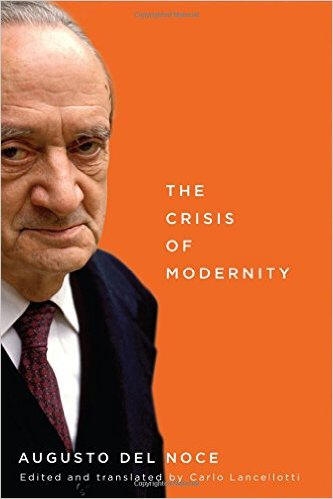Book Review
The Crisis of Modernity
Augosto Del Noce.
McGill-Queen's University Press (1 January 2015)
ISBN: 978-0773544437
 Augosto
Del Noce was one of the greatest Italian philosophers of the twentieth
century. He argued that the way to understand Western secularism, as we
now have it, is by understanding the various philosophical trends that
have replaced Christianity: Idealism, Marxism, Positivism etc. He was one
of the first to predict the failure of the Marxist project. He also noted
that this failure would not lead the West to return to its Christian
roots. Rather, a new gnosis would replace the old one, materialistic and
atheistic. We are to live in a technocratic society which gives us little
space to contemplate the eternal truths.
Augosto
Del Noce was one of the greatest Italian philosophers of the twentieth
century. He argued that the way to understand Western secularism, as we
now have it, is by understanding the various philosophical trends that
have replaced Christianity: Idealism, Marxism, Positivism etc. He was one
of the first to predict the failure of the Marxist project. He also noted
that this failure would not lead the West to return to its Christian
roots. Rather, a new gnosis would replace the old one, materialistic and
atheistic. We are to live in a technocratic society which gives us little
space to contemplate the eternal truths.
This book contains some of his essays on the cultural history of the twentieth century, translated into English for the first time. It is a remarkable work. He reflects on a variety of topics including secularism, scientism and the sexual revolution.
When writing about the sexual revolution, he concentrates a good deal on the work of Wilhelm Reich, a psychologist who went insane. He was very much in the mould of the Marquis de Sade, another character who went insane and one who Del Noce has much to say about. It would appear that de Sade rather than Marx is the iconic figure of our time.
Del Noce observes that for our contemporary secularists, the world is without purpose. The pursuit of pleasure becomes the antidote to overcome the pain of this world. In contrast, the pursuit of the virtues, including temperance, becomes abnormal. Or, as Reich would say, let not the dead suffocate the living. The past must be rejected, says Reich, in order for us to attain psychological stability. The family, as we have always understood the term, has to go. The Marxists and the Freudians would have agreed with this. But in the nineteen thirties, both psychoanalysts and Marxists began to reject Reich's ideas. Freud said that civilization can only exist by denying the instincts. Morality had to be strengthened and not destroyed. Reich rejected these views of Freud, which he saw as belonging to the past. As for the Marxists who were looking forward to a noble future, Reich preferred to look back to the noble savage of the past.
And yet, is not Reich the true disciple of Freud? The atheist Freud saw the world as without purpose. Why should man pursue a moral life in such a meaningless universe? Surely, de Sade and Reich are the true children of the Freudian revolution?
The remedy for Del Noce is a return to classic metaphysics. And he is surely correct in his analysis.
Reviewed by Dr Pravin Thevathasan
